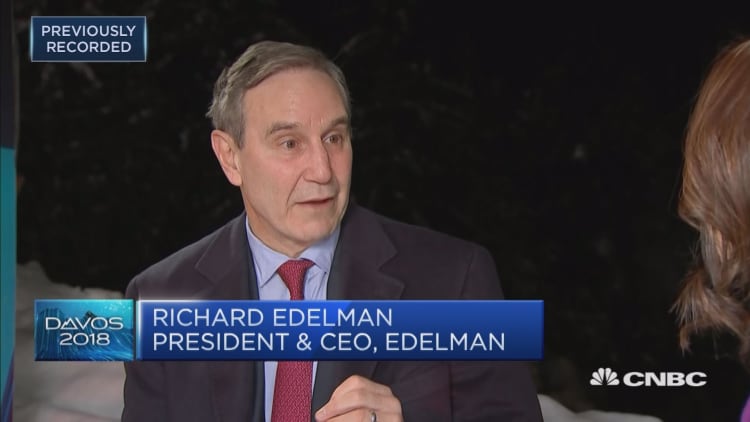
Global confidence among business leaders appears to be high given positive global growth prospects, but a number of chief executives of some of the world's largest companies told CNBC that there was no room for complacency.
PwC released a global CEO survey for 2018 this week that revealed record optimism among chief executives in terms of their view on the global economic outlook. Speaking to CNBC on the sidelines of the World Economic Forum (WEF) in Davos, Switzerland, Global Chairman of PwC, Bob Moritz, explained the rationale behind the uptick in confidence.
"Two things are happening, you've got the market trends that are still very positive then you've got the rise of the consumer, the rise of the middle class on a worldwide basis and in particular in Asia, APAC (Asia Pacific), and the second thing is that it's the first time when you've had all regions around the world equally as positive," he said.
Moritz said that while traditional risks to businesses — such as foreign exchange fluctuations and access to capital — had decreased, other risks had risen such as the threat of terrorism, climate change and geopolitics.
This year's survey by PwC saw the highest-ever jump to the highest-ever level of CEO optimism regarding global growth prospects over the next 12 months. The global auditing giant said that for the first time since it began asking the question in 2012, the majority of CEOs surveyed believe global economic growth will "improve".
In fact, the percentage of CEOs predicting "improved" growth doubled from last year. This record level of optimism was seen across every region from the U.S. and Canada and Latin America to Western Europe, Central & Eastern Europe (CEE), Africa, the Middle East, and Asia-Pacific.
Trump the headline act
WEF's theme in 2018 is "Creating a shared future in a fractured world" and the organizers of the annual meeting hope that the 3,000 or so participants will come to shared solutions and actions to try to resolve the world's most pressing problems and challenges, such as inequality, climate change and innovations in technology and labor markets.
Participants at Davos range from political and business leaders to public and private policymakers and the odd celebrity. On Tuesday, Indian Prime Minister Narendra Modi is the headline guest although the attendance of President Donald Trump on Friday is likely to attract the most attention.

The attendees in the Alpine resort this week can certainly be warmed by the prospect of improving global growth. On Monday, the International Monetary Fund released its mid-term economic outlook in which global growth forecasts for 2018 and 2019 were revised upward by 0.2 percentage points to 3.9 percent.
Mark Weinberger, global chairman and chief executive of EY, told CNBC at Davos that chief executives were generally optimistic, particularly at a time of synchronized growth around the world.
"There's broad-based growth around the world, we're seeing confidence increase, investment by businesses that have restructured themselves is up, financial markets are up and jobs and hiring," he said.
"Certainly though we can't ignore the fact that there's a lot of turmoil out there. We can talk this year about a lot of the good things, certainly accomodatative monetary policy, but we also need to focus on a lot of the things that created uncertainties last year like income inequality and making sure that innovation and technology continues in an inclusive way, not just making the rich richer and the rest are left out," he said.

Another source of uncertainty for business leaders and politicians is the Trump administration whose first year in office has been characterized by some unpredictable and surprising policy changes both at a foreign policy level and on the domestic front. Trump has also popularized the phrase "fake news" leading many of his supporters to distrust the mainstream media.
President and Chief Executive Officer of Edelman, Richard Edelman, told CNBC on Tuesday that trust in the U.S. government, and beyond, had dropped, according to the company's annual "Trust Barometer" for 2018 that showed trust in public institutions is in crisis around the world.
The general population's trust in all four key institutions — business, government, NGOs, and media — has declined broadly, a phenomenon not reported since Edelman began tracking trust among this segment in 2012. Richard Edelman told CNBC that trust in government was particularly low in the U.S.
"Well it was led down by government which dropped 30 points for the opinion leaders and 14 points for the mass population, and people don't have a sense of confidence in what's being said — not just the policies — there's an instability in a world without facts. It's moving quite quickly and it's disturbing people," he said.






